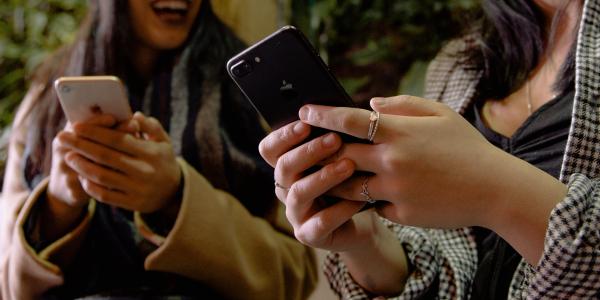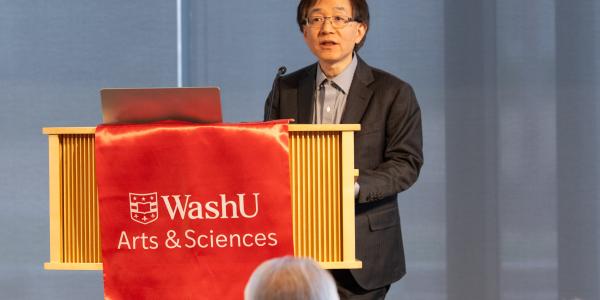When Emma Lembke got her first social media account — Instagram — at age 12, it didn’t take long for her to realize the seemingly magical platform had a darker side. “After a few months, I realized it was more like a mirage,” Lembke said. “Social media is a platform that’s predicated on maximizing my attention at the cost of my well-being.”
As a high school senior, Lembke founded Log Off, a nonprofit to help young people develop healthy social media habits. What started with a basic website soon snowballed into a global movement, national media appearances, and invitations to testify before the U.S. Senate Judiciary Committee and visit the White House.
Lembke sat down to discuss her decision to go to WashU, the benefits of a liberal arts education, and how she juggles activism and coursework.

How did you come up with the idea for Log Off?
In the ninth grade, I reached a breaking point with social media. I did a lot of research, and while I found robust information on social media’s impact on young people and humanity, what I couldn't find were the voices of young people themselves. I thought that was an incredible injustice.
At its core, Log Off is a mechanism to help young people build better, healthier relationships with technology by centering them in the conversation and empowering them to be activists. I hope that will eventually lead to voting and holding Big Tech accountable.
What led you to WashU?
Log Off completely altered my trajectory. Initially, I wanted to study archaeology and Egyptology. But when I was applying to schools, I looked for programs with flexibility because part of me knew that if the Log Off movement continued to take off, that’s what I wanted to do. I looked for schools that valued a holistic, well-rounded education that would provide me with the tools I needed to be the activist I wanted to be. When I looked at WashU, I fell in love with the flexibility and the importance of engaging and connecting across disciplines to create effective solutions.
You’re a political science major, but you’ve seemingly created a custom curriculum around civic activism.
Yes, I did. “Introduction to Digital Anthropology” was one of the coolest classes I've taken. Now I'm in “Social Media and American Democracy.” I've also taken coding, statistics, and economics courses. It's this beautiful puzzle of looking at the course list every semester and asking, "What is going to help me be the most effective advocate?" It’s been exciting to figure out what that combination is going to be each semester.
"Never in a million years did I think so many people would want to engage and hear my voice. It has been an incredibly empowering experience."
How did you learn to be such an effective public speaker?
I would largely attribute it to musical theater in high school. In my first semester at WashU, I was Wednesday in the student-led production of “The Addams Family.” I’ve also taken courses in musical theater and dance, and I’m trying to get into acting. When I went to testify in front of the U.S. Senate Judiciary Committee, a prominent political figure encouraged me to take more theater classes. She said that to be an effective leader, you need to understand how to present yourself and how that presentation is affecting others.
How do you juggle Log Off with WashU coursework and being a college student?
There’s always an ebb and flow, but it’s difficult. I think what makes it worthwhile is that it never feels like a job. And because I’ve been able to curate my WashU course load, the information I learn goes right back into my activism. When I go to class, it can ebb into having a call with the Gender Policy Council because I’ve just learned something about federal lawmaking, and then I'm talking with a federal lawmaker. So, it all feels interconnected.
You were invited to the White House in 2023 to watch President Biden sign an executive order establishing new standards for artificial intelligence safety and security. What was that like?
When I got the email from the White House I thought it was a joke or a scam. I had to miss class, but I was able to go and be in a room with some of the most powerful people I've ever seen — Sen. Chuck Schumer, Vice President Kamala Harris, President Biden. It was just a remarkable moment. I've been fighting for three years to emphasize the narrative that young people are capable of being involved in this conversation at a high level. This felt like a victory.
(Header image: Wendy Wei/Pexels)





